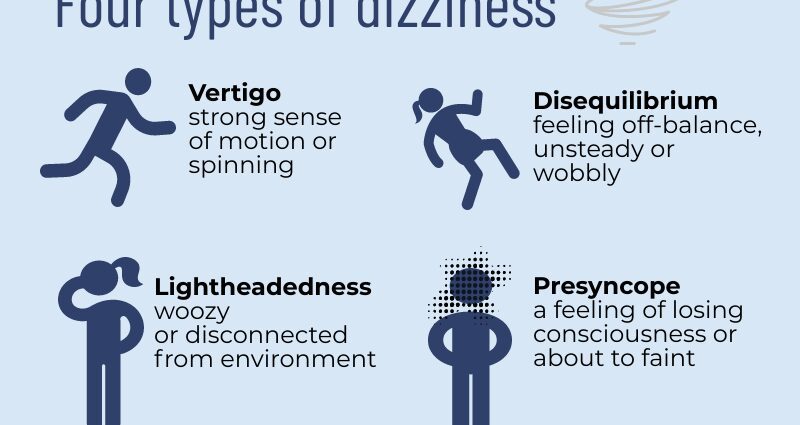Contents
Dizziness and vertigo
How are dizziness and vertigo characterized?
Sensation of “head spinning”, loss of balance, the impression that the walls are moving around us, etc. Dizziness and vertigo are unpleasant feelings of imbalance, which can go as far as being accompanied by nausea and vomiting.
They can be more or less severe, frequent or infrequent, intermittent or permanent, and can be caused by a variety of diseases and disorders.
These are very frequent reasons for medical consultation. These are common symptoms, which can, in rare cases, be due to a serious pathology.
What are the causes of dizziness and vertigo?
It is important to distinguish between simple dizziness (light feeling of spinning head) and severe dizziness (inability to get up, nausea, etc.).
Dizziness is common and can be due to, among other things:
- a temporary drop in blood pressure
- weakness due to an infectious disease (flu, gastroenteritis, cold, etc.)
- to an allergy
- stress and anxiety
- the consumption of tobacco, alcohol, drugs or medication
- to a pregnancy
- hypoglycemia
- temporary fatigue, etc.
Dizziness, on the other hand, is more disabling. They correspond to an illusion of movement, either rotational or linear, an instability, a feeling of drunkenness, etc. They usually occur when there is a conflict between the position signals perceived by the brain and the actual position of the body.
Vertigo can therefore result from an attack:
- of the inner ear: infection, Ménière’s disease, benign paroxysmal positional vertigo;
- cranial nerves which transmit information: acoustic neuroma, neuritis;
- brain centers responsible for proprioception: ischemia (stroke), inflammatory lesion (multiple sclerosis), tumor, etc.
To determine the cause, the doctor will do a full clinical examination and look at:
- the characteristics of vertigo
- when it appears (old, recent, sudden or progressive, etc.)
- at its frequency and the circumstances of occurrence
- the presence of associated symptoms (tinnitus, pain, migraine, etc.)
- medical history
Among the most frequent diagnoses in cases of vertigo, benign paroxysmal positional vertigo comes first (constituting a third of the causes of consultation for vertigo). It is characterized by a violent, rotatory dizziness which lasts less than 30 seconds and which occurs during changes of position. Its cause: the formation of deposits (calcium carbonate crystals) in the semicircular canal of the inner ear.
In cases where the vertigo is continuous and long (several days), the most common cause is neuronitis or vestibular neuritis, that is, inflammation of the nerve that innervates the inner ear. The cause is not very clear, but it is usually assumed to be a viral infection.
Finally, Ménière’s disease is a common cause of dizziness: it results in attacks which are accompanied by hearing problems (tinnitus and hearing loss).
What are the consequences of dizziness and vertigo?
Dizziness can be extremely debilitating, even preventing the person from standing or moving. When accompanied by nausea or vomiting, they are particularly distressing.
Dizziness can also affect the quality of life and limit activities, especially if it is frequent and unpredictable.
What are the solutions for dizziness and vertigo?
The solutions obviously depend on the underlying causes.
Management therefore requires first establishing a clear diagnosis.
Paroxysmal positional vertigo is treated with a therapeutic maneuver that disperses the debris present in the inner ear and restores normal functioning.
Vestibular neuritis, on the other hand, heals without treatment but can persist for several weeks. Anti-dizziness drugs and certain vestibular rehabilitation exercises can help reduce the discomfort.
Finally, Ménière’s disease unfortunately does not benefit from any effective treatment, even if many measures make it possible to space out attacks and limit discomfort.
Read also :Our fact sheet on vagal discomfort What you need to know about hypoglycemia |











Ман бемор сар чархзани дилбехузури бемадор норахати хис кардаистодаам
Сабабгорашам Чи бошад хечоям дард накардос сарам вазмин хискардаистодаам